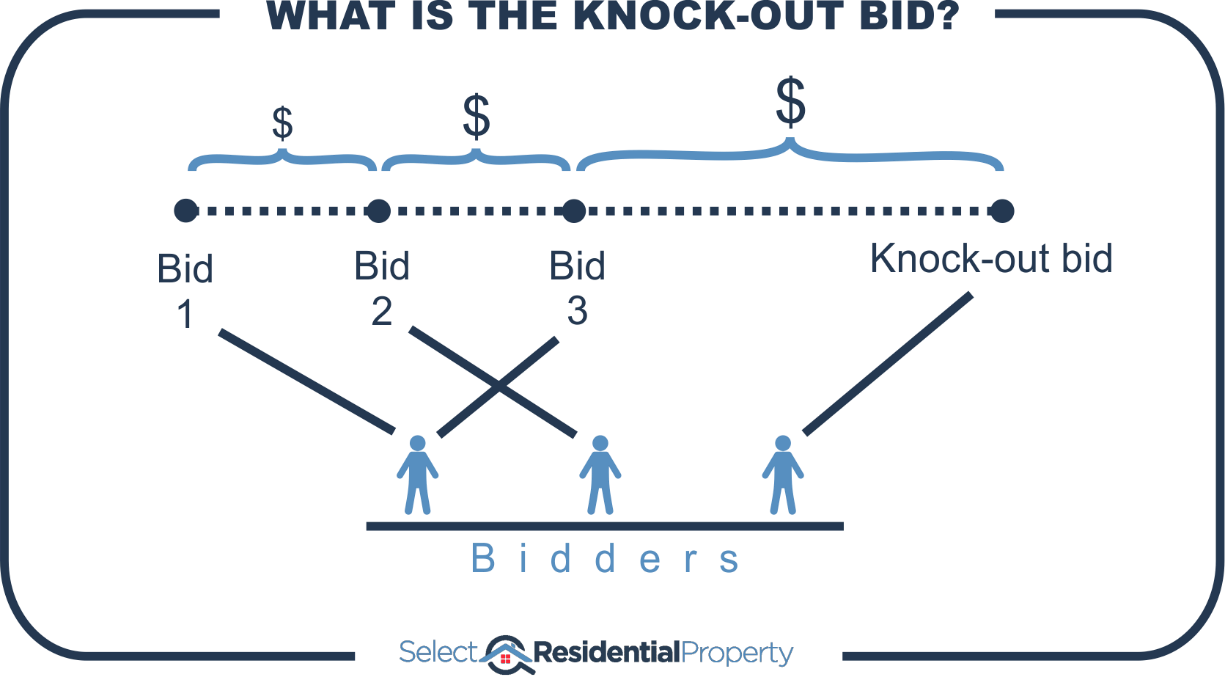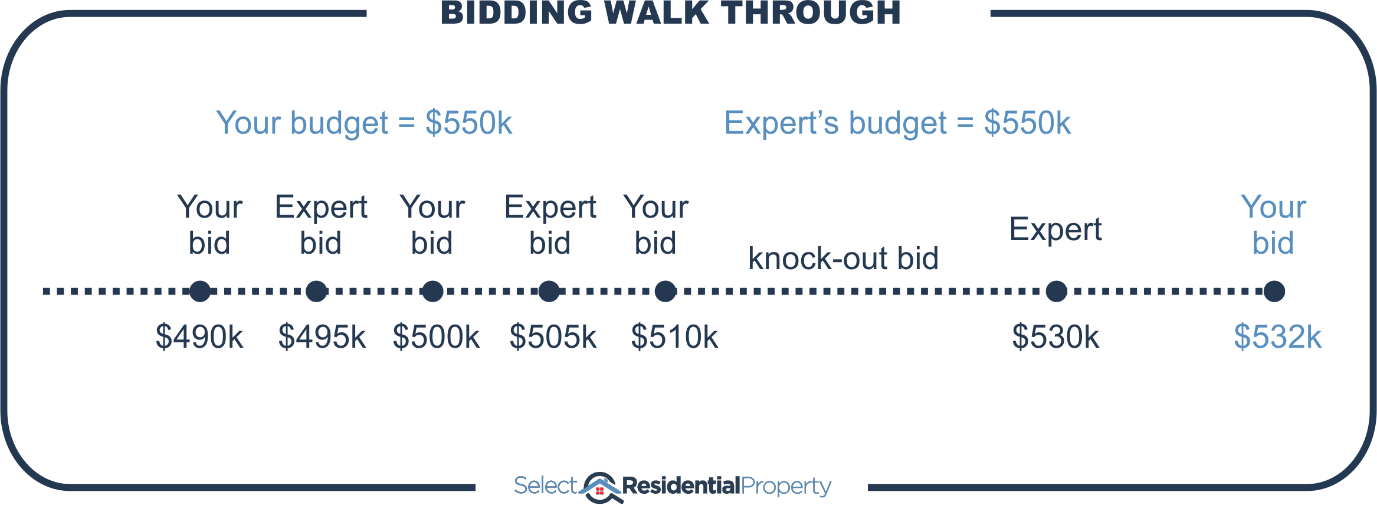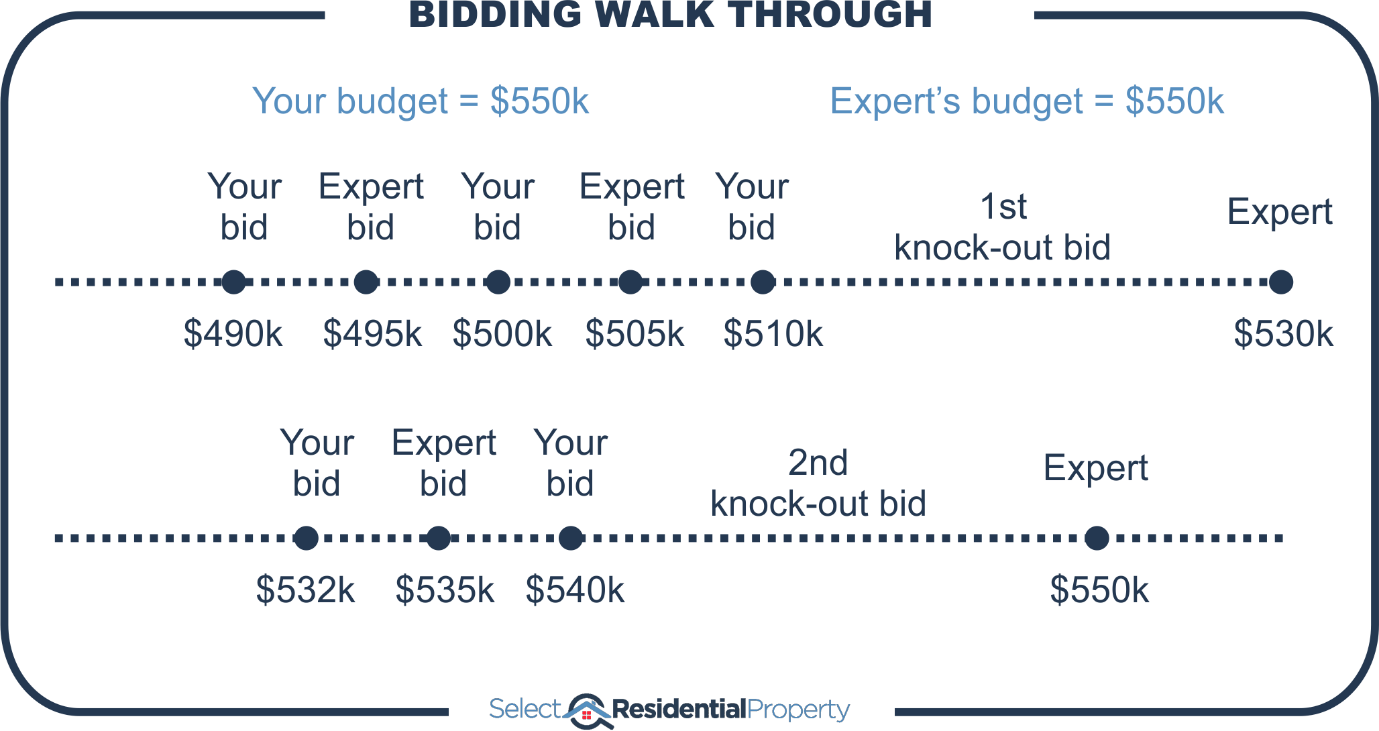Introduction
The knock-out (or slam) bid is a tactic supposedly used by expert auction bidders to knock their competitors out of the auction. Instead of raising the price by small increments of one or two thousand dollars, the knock-out bidder puts in a large bid like $10,000.

The theory is that the competition will feel intimidated. I’ve heard one professional put it this way:
“You want to give the perception that you have an endless supply of money that the person will just give up”
Clarification
Note that the knock-out bid is not simply a very large number, it’s a large increment. The idea of the knock-out bid is to remove other bidders before they reach their limit.
If you simply have more money than all the other bidders, then you’ll eventually knock them out anyway with small incremental bids. But the knock-out bid aims to remove them at a lower price point – saving you money.
But the logic is flawed, it’s more likely to cost-you than save-you.
Imagine
Let’s just walk through a hypothetical example to see if it makes obvious sense. Say you’ve found a property you like. You’ve been to a couple of the open inspections. You’ve given it a lot of thought and discussed it with your partner. You’ve both agreed it’s worth acquiring. You get a building inspection done and a pest inspection. You’ve had a conveyancer go over the title. You’ve arranged finance and maybe even got an independent valuation. You’ve gone to a lot of trouble in preparation for this auction. It’s no small deal.
The auction is this weekend and you have a budget of $550,000. You’re hoping the property will sell for around that mark, ideally for less, but you never know who’s going to turn up.
Now imagine a professional turns up to the auction, probably a buyer’s agent. They’ve discussed this opportunity with their client and plan to pay no more than $550,000 – same budget as you. But of course, you don’t know this. And they don’t know your budget either.
The bidding goes up by $5,000 increments until it reaches $510,000 when the expert jumps in with their knock-out bid: $530,000!

Now you’ve seen they’re a serious buyer and they appear to have a lot of money. So, you may as well pack up and go home, right? They’re going to win obviously because they jumped up in price by $20,000.
Hang on, what’s your budget? $550k. Where’s the price at? $530k. Why would you give up and walk away when the price hasn’t even reached your limit yet? You’re still in with a chance.
Why would anyone in your position walk away? You’ve spent weeks arranging finance, you’ve visited the property a few times now and paid for building and pest inspections. You’ve gone to a lot of trouble and the price is below your budget. But just because the professional’s bid jumped up by $20,000, you’re going to give up? Is that a serious consideration to a normal human being, one that can afford to buy a property? Why would anyone just walk away when the top bid is below their budget?
Nobody & nothing
Nobody is going to walk away from the auction without at least having a crack with their top dollar.
So, what impact did the knock-out bid have exactly, – nothing! You come back with $532,000 and bidding continues.

Let’s keep going. Maybe bidding goes up by $1,000 increments from here all the way to $540,000 before the professional tries another knock-out bid: $550,000! A $10,000 jump.

The professional is right at their limit now. And so are you. If you really can’t go any further, then you have to decline all invitations from the auctioneer to go any higher. You’re out and the expert wins.
The expert auction bidder will congratulate their client telling them that the knock-out bid worked. But really, all that happened, was you reached your limit. A limit that was decided prior to ever hearing any knock-out bids.
How come the 1st knock-out bid didn’t work but the 2nd one did? The 1st knock-out bid was twice as big as the second one. Why didn’t the 1st one work? Because the 1st knock-out bid didn’t exceed your limit, but the 2nd one did.
Notice how it has nothing to do with the size of the bid increment, it has everything to do with the highest bid – the end value. The same result would have occurred if bidding incrementally exceeded your limit.
A slightly different scenario
What if your limit was not $550,000 but was only $540,000? Here’s what would have happened…

By not going up in increments of $2,000 the professional actually cost their client $8,000 more than they needed to win.
Knock-out bids can be very costly. It’s highly unlikely they’ll ever actually save any money, far more likely to end up costing more.
Auctions are designed so that the highest bid wins and there are no tricks you can play to get around that.
“But I’ve seen it work Jeremy”
No doubt there’ll be loads of professionals out there that will try to tell you they’ve seen it work. Here’s what I hear all the time:
Jeremy, I’ve been to over a thousand auctions and I’ve used this successfully many times. I’ve put in the slam bid and knocked out the last bidder to win the property for my client more times than I can remember.
That is NOT proof it works. What that tells me is that possibly a hundred thousand dollars more than necessary has been lost to an imaginary auction tactic.
But Jeremy, we appraised the property at $830,000 and won it at $815,000.
Maybe, but if the next highest bid was going to be $805,000, then you just cost your client $10,000.
The only time there could be any evidence of this tactic working, is if after the auction, one of the other bidders approached the expert and said something like:
I could tell you were gonna get this at any cost, so I thought why bother, I’ll quit early. I was actually gonna go as high as $700k, but I thought why should you spend $705,000? Why don’t I let you have it for $690,000? So, I stopped $10,000 early. Maybe you could buy me lunch now.
That doesn’t sound like an intimidated bidder to me. It sounds generous, maybe stupid, possibly even pure BS. But if the losing bidder’s statements could be believed, this would be some evidence that the trick works.
“Simply winning the auction with a knock-out bid isn’t evidence it works; it could be just coincidence”
Auction laws in every state of Australia are designed to prevent intimidation from affecting the result. There’s a very simple rule – highest bid wins.
To know that the knock-out bid worked, the other bidder needs to drop out before they reach their limit. You can’t say the knock-out bid worked unless the winning bid was lower than the other bidder’s maximum bid.
Odd auction advice
Here’s some more advice I’ve heard that makes me go, “Hmm”:
Arrive early at least a half an hour.
Getting their early doesn’t give me any credit with the auctioneer. If I turn up just before the third and final call and make the highest bid, I’ll win.
I’ve also heard you should…
Survey the landscape, see who is there, and find out who your competition is.
How does knowing my competition help? Does it mean they’ll bid lower because I’ve checked them out?
Here’s another one:
Dress smartly and portray confidence.
Will the auctioneer ignore my bid if I’m wearing a T-shirt? Not if it’s the highest bid.
Here’s some more nonsense…
Stand front and centre and let people know that you are there to bid.
You don’t need to stand in the way for people to know you’re there to bid. What you need to do… is bid.
Start with a strong bid and make your last bid as strong as your first bid.
Highest bid wins, regardless of how timidly it was made.
Wear sunglasses so other bidders can’t read you.
It’s not poker. If you’ve got nothing left in the bank account, DO NOT BLUFF!
Turn up late in an expensive car so everyone sees you
This is pretty pathetic advice. Firstly, if you turn up late, the parking spot you’ll get will be well away from a well-attended auction. Secondly, regardless of how much wealth you pretend to ooze, you still need to bid higher than anyone else.
Not only is this advice pointless, it might even backfire if you’re too convincing. Other bidders might resent your wealth and bid foolishly above their budget just to waste your money assuming you’ll always out-bid them.
Conclusion
There’s only one tactic that will work every time - bid higher than everyone else.
....................................................................................
 Jeremy Sheppard is head of research at DSRdata.com.au.
Jeremy Sheppard is head of research at DSRdata.com.au.
DSR data can be found on the YIP Top suburbs page.
Click Here to read more Expert Advice articles by Jeremy Sheppard
Disclaimer: while due care is taken, the viewpoints expressed by contributors do not necessarily reflect the opinions of Your Investment Property.